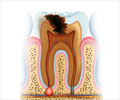- Dentine hypersensitivity-a review. Clinical and in vitro evaluation of treatment agents - (https://pubmed.ncbi.nlm.nih.gov/6350374/)
- Consensus-based recommendations for the diagnosis and management of dentin hypersensitivity - (https://pubmed.ncbi.nlm.nih.gov/12662460/)
- Aetiology, prevalence and clinical features of cervical dentine sensitivity - (https://pubmed.ncbi.nlm.nih.gov/9049914/)
- Influence of procedural variations during the laboratory phase of complete denture fabrication on patient satisfaction and denture quality - (https://www.sciencedirect.com/science/article/abs/pii/S0300571213001863?via%3Dihub)
- Efficacy of a dentifrice containing potassium nitrate, soluble pyrophosphate, PVM/MA copolymer, and sodium fluoride on dentinal hypersensitivity: a twelve-week clinical study - (https://pubmed.ncbi.nlm.nih.gov/8534380/)
- Recent advances in dentin hypersensitivity: clinically proven treatments for instant and lasting sensitivity relief - (https://pubmed.ncbi.nlm.nih.gov/21284246/)
About
Are you seeking relief from the discomfort of sensitive teeth and wondering about its symptoms? Tooth sensitivity, characterized by sharp pain or discomfort in response to various stimuli, is a common dental issue affecting many individuals. Whether it's exposure to cold air, hot or cold temperatures, sweet or acidic foods, or even routine dental care like brushing and flossing, sensitivity can make everyday activities uncomfortable.
What is Tooth Sensitivity?
Tooth sensitivity manifests as sharp pain or discomfort when exposed to a stimulus like cold air, hot or cold temperatures, sweet or acidic foods, or routine oral hygiene practices like brushing and flossing. Experiencing sudden sensitivity in one tooth or many teeth are common indicators of dental hypersensitivity(1✔ ✔Trusted Source
Dentine hypersensitivity-a review. Clinical and in vitro evaluation of treatment agents
Go to source).
Teeth Sensitivity Causes
Enamel Erosion from Acidic Foods and Drinks: Consuming foods and beverages high in acidity, such as citrus fruits, sodas, and certain wines, can gradually wear down the protective enamel layer of the teeth. Acid regurgitation is also known to cause dental erosion. Over time, this erosion exposes the underlying dentin, leading to increased sensitivity to hot, cold, sweet, or acidic substances.
Gum Recession Exposing the Cementum Layer: Gum recession occurs when the gum tissue surrounding the teeth pulls away, exposing the sensitive root surfaces of the teeth. This can be caused by factors such as gum disease, aggressive brushing, or genetic predisposition. When the cementum becomes exposed, it can result in heightened sensitivity to temperature changes and certain foods.
Aggressive Brushing Leading to Enamel Wear: Brushing your teeth vigorously or using a toothbrush with hard bristles can lead to gradual loss of enamel. It is the protective outer layer of the tooth, and when it thins or wears down, it exposes the underlying dentin, which contains nerve endings. This can result in increased sensitivity to hot, cold, sweet, or acidic stimuli.
Tooth Decay or Cavities Allowing Bacteria to Reach the Nerves: Tooth decay occurs when bacteria in the mouth produce acids that erode the enamel and create cavities in the teeth. If left untreated, these cavities can deepen and eventually reach the inner pulp chamber, where the tooth's nerves and blood vessels are located. When the nerves become exposed to bacteria and external stimuli, it can lead to tooth pain and discomfort.
Dental Procedures like Whitening Treatments or Fillings causing Temporary Sensitivity: Certain dental procedures, such as teeth whitening treatments or dental fillings, can cause temporary sensitivity in the teeth. Certain ingredients used in whitening agents and dental materials used for fillings can temporarily irritate the nerves of the teeth, resulting in heightened sensitivity to hot, cold, sweet, or acidic substances. However, this sensitivity usually resolves on its own after a short period of time(2✔ ✔Trusted Source
Consensus-based recommendations for the diagnosis and management of dentin hypersensitivity
Go to source).
Did You Know?
Some people experience increased tooth sensitivity after taking aspirin. This is because aspirin can temporarily irritate the lining of the mouth and gums, making teeth more sensitive.Foods and Ingredients that can Cause Sensitivity in Teeth
Occasionally, individuals may experience tooth sensitivity as a result of specific ingredients found in toothpaste, such as sodium lauryl sulfate (SLS), which serves as a foaming agent in many formulations.
Sodium Lauryl Sulfate (SLS): Some individuals may find that SLS causes irritation and exacerbates tooth sensitivity. In such cases, switching to a toothpaste labeled as "SLS-free" could potentially alleviate symptoms and improve comfort during oral care routines.
Mint Flavors: While mint flavors are commonly added to toothpaste for their refreshing taste, they can be irritating to sensitive gums and oral tissues, especially in individuals prone to allergies or sensitivities to menthol or peppermint oil.
Alcohol: Some toothpaste formulations contain alcohol as a solvent or preservative. Alcohol can be drying and irritating to the mucous membranes of the mouth, potentially causing discomfort or sensitivity, especially in individuals with dry mouth or oral sensitivities.
Abrasive Agents: Certain toothpaste formulations may contain abrasive agents, such as silica or baking soda, to help remove surface stains and plaque. While effective at cleaning teeth, abrasive agents can be harsh on tooth enamel and gums, leading to increased sensitivity in some individuals, particularly if they have thin enamel or gum recession.
Worst Foods For Sensitive Teeth
Acidic Foods: Citrus fruits, tomatoes, vinegar, and other acidic foods can erode tooth enamel, exposing the sensitive dentin layer and increasing sensitivity.
Hot and Cold Foods: Extreme temperatures, such as ice cream, hot soup, or hot coffee, can trigger sensitivity and cause discomfort, especially if the enamel is already compromised.
Hard Foods: Crunchy snacks like hard candies, popcorn kernels, and nuts can put pressure on teeth, potentially aggravating sensitivity or causing dental fractures.
Sugary Foods and Beverages: Candies, sodas, and sugary snacks promote bacterial growth and acid production, leading to enamel erosion and increased sensitivity.
Sticky Foods: Chewy candies, dried fruits, and sticky snacks can adhere to teeth, making it difficult to clean them properly and potentially leading to enamel erosion and sensitivity.
Carbonated Beverages: Carbonated drinks contain high levels of acidity and sugar, which can wear down enamel and contribute to tooth sensitivity over time.
Alcoholic Beverages: Some alcoholic beverages, especially those with high sugar content like cocktails and sweet wines, can promote bacterial growth and enamel erosion, worsening sensitivity(3✔ ✔Trusted Source
Aetiology, prevalence and clinical features of cervical dentine sensitivity
Go to source).
Did You Know?
Capsaicin, the compound that gives chili peppers their heat, can actually have a desensitizing effect over time. While spicy food might initially trigger sensitivity, regular consumption in moderation could lead to some relief.Sensitive Teeth Symptoms
Sensitive teeth symptoms can manifest in various ways, indicating underlying dental issues. Individuals with sensitive teeth may experience sharp, sudden pain or discomfort when consuming hot or cold foods and beverages.
If your teeth hurt when you brush or eat certain foods, it could be a sign of sensitivity. Pay attention to these symptoms. Additionally, sensitivity to sweet or acidic foods can indicate enamel erosion or dentin exposure, necessitating prompt dental evaluation and management.
Did You Know?
Tooth sensitivity doesn't always manifest as sharp pain. Some people experience a dull ache, tingling, or discomfort, especially when exposed to triggers.Temperature Sensitive Teeth
Temperature sensitive teeth pose challenges for individuals, affecting their ability to enjoy hot and cold foods and beverages comfortably. This sensitivity stems from various factors, including aggressive brushing, enamel erosion, dentin exposure, and gum recession. Managing temperature sensitive teeth involves using desensitizing toothpaste, avoiding extreme temperatures, and practicing good oral hygiene habits and visiting a dentist for evaluation and treatment if indicated.
Teeth Sensitivity to Cold
Teeth sensitivity to cold is a prevalent issue affecting individuals of all ages. Sensitive teeth can hurt when exposed to cold stimuli like ice cream or cold drinks. It may cause sharp pain or discomfort.
Tooth sensitivity occurs when enamel wears down, gums pull back, or dentin is exposed, allowing cold to reach tooth nerves. Managing teeth sensitivity to cold often involves using desensitizing toothpaste, avoiding extreme temperatures, and seeking dental advice for underlying causes.
Teeth Sensitivity to Hot Temperature
Teeth sensitivity to hot temperatures can be a discomforting experience, causing sharp, sudden pain or discomfort when consuming hot foods or beverages. This sensitivity often arises due to exposed dentin, the layer beneath the tooth enamel, which contains tiny nerve endings. When hot substances come into contact with exposed dentin, it can trigger a rapid response from these nerves, leading to discomfort. Causes of teeth sensitivity to hot temperatures may include enamel erosion from acidic foods or beverages, gum recession exposing the tooth roots, or dental procedures like teeth whitening.
Common Signs of Sensitive Teeth
Recognizing common signs of sensitive teeth is crucial for early intervention and management. Among the most prevalent signs are discomfort or pain when consuming hot, cold, sweet, or acidic foods and beverages. Gum sensitivity is also a common sign.
Sensitivity during brushing, flossing, or exposure to cold air may also indicate underlying dental issues. People with these symptoms should see a dentist to find out why their teeth are sensitive. The dentist can suggest treatments like lifestyle changes, desensitizing agents and minor restorative procedures.
Teeth Sensitivity in Children
Teeth sensitivity in children can be distressing for both the child and the parent. Children may exhibit signs of sensitivity when consuming cold or hot foods, leading to reluctance in eating or drinking. Common causes include enamel defects, tooth decay, or exposed dentin due to poor oral hygiene practices. Parents should help kids keep their teeth healthy by brushing, flossing, and seeing the dentist regularly to prevent sensitivity.
Teeth Sensitivity in Adults
Teeth sensitivity in adults is a prevalent concern that can significantly impact oral health and quality of life. Reasons for sensitivity in adults include enamel wear, receding gums, cavities, and dental treatments like whitening or fillings. Adults experiencing sensitivity should consult with a dentist to identify the underlying cause and develop a personalized treatment plan. Using natural remedies like fluoride treatments or desensitizing toothpaste at home can ease sensitive teeth and improve dental health(4✔ ✔Trusted Source
Influence of procedural variations during the laboratory phase of complete denture fabrication on patient satisfaction and denture quality
Go to source).
Did You Know?
Just like many other health issues, tooth sensitivity can have a genetic component. If your parents or siblings experience sensitivity, you might be more predisposed to it as well.Effective Teeth Sensitivity Management
Desensitizing Toothpaste: Start by switching to a toothpaste specifically designed for sensitive teeth. These toothpastes contain compounds like potassium nitrate or strontium chloride, which help block pain signals to the nerves in your teeth, providing relief over time.

Types of Desensitizing Pastes
| Active Ingredient | Function | Examples of Brands |
| Potassium Nitrate | Blocks channels transmitting pain signals | Sensodyne, Colgate Sensitive |
| Strontium Chloride | Desensitizes nerve endings directly | Crest Sensi-Relief, Pronamel |
| Fluoride | Strengthens enamel, reduces sensitivity | Sensodyne Repair & Protect, Colgate Sensitive Pro-Relief |
| Calcium Phosphates | Helps rebuild and strengthen enamel | Crest Gum Detoxify, Sensodyne Repair & Protect |
| Arginine | Forms protective layer over dentin |
Colgate Sensitive Pro-Relief Enamel Repair(5✔ ✔Trusted Source Efficacy of a dentifrice containing potassium nitrate, soluble pyrophosphate, PVM/MA copolymer, and sodium fluoride on dentinal hypersensitivity: a twelve-week clinical study Go to source) |
Home Remedies for Sensitive Teeth: This include saltwater rinse and oil pulling, which reduce inflammation and bacteria naturally. Incorporating fluoride strengthens enamel, combating sensitivity effectively.
Avoid Acidic Foods and Drinks: To protect sensitive teeth, avoid acidic and sugary foods that can damage enamel and cause pain.
Soft Bristle Toothbrush: Choose a soft toothbrush to protect your enamel and gums, keeping your mouth clean without causing irritation.
Mouthguard for Protection: Mouthguards prevent enamel wear due to tooth grinding or clenching, offering nighttime protection and reducing sensitivity.
Temperature Management: Avoid extreme temperatures and choose lukewarm water during oral care to prevent sensitivity triggers.
Professional Treatment: Dental care professionals offer treatments like application ofbonding agent, rootcanal therapy, or surgical gum grafts to address underlying issues causing sensitivity.
Maintain Good Oral Hygiene: Brush and floss your teeth regularly to remove plaque and prevent gum disease, which can exacerbate sensitivity. Use a soft-bristled toothbrush and gentle brushing technique to avoid further enamel wear.
Fluoride Treatments: Consider using fluoride mouthwash or applying fluoride gel to your teeth to strengthen enamel and reduce sensitivity. Fluoride helps remineralize enamel and can make your teeth more resistant to sensitivity triggers(6✔ ✔Trusted Source
Recent advances in dentin hypersensitivity: clinically proven treatments for instant and lasting sensitivity relief
Go to source).
Natural Remedies for Sensitive Teeth at Home
Teeth sensitivity home remedies include:
| Natural Remedies | Description |
| Saltwater rinse | Reduces inflammation and bacteria, providing relief from sensitivity. |
| Oil pulling | Swishing coconut oil or sesame oil helps remove bacteria and soothe sensitive teeth. |
| Baking soda paste | Neutralizes acids and strengthens enamel, reducing sensitivity. |
| Green tea | Contains antioxidants and anti-inflammatory properties, promoting gum health. |
| Aloe vera gel | Soothes irritated gums and provides relief from sensitivity. |
| Turmeric paste | Anti-inflammatory and antibacterial, reducing sensitivity and promoting oral health. |
Preventive Measures for Sensitive Teeth
Preventing tooth sensitivity involves adopting proactive oral hygiene habits and making lifestyle adjustments to protect enamel and maintain optimal dental health.
Dietary Tips for Sensitive Teeth
- Limit Acidic Foods and Beverages: Minimize consumption of acidic foods and drinks, such as citrus fruits, sodas, and sports drinks, which can erode enamel and exacerbate sensitivity.
- Drink Water After Meals: Rinse your mouth with water after consuming acidic or sugary foods to neutralize acids and reduce their impact on tooth enamel.
- Use a Straw: When drinking acidic beverages, use a straw to minimize contact with teeth and reduce the risk of enamel erosion.
- Chew Sugar-Free Gum: Chewing sugar-free gum stimulates saliva production, which helps neutralize acids and remineralize enamel, reducing the risk of sensitivity.
Oral Hygiene Practices
- Brush Gently: Use a soft-bristled toothbrush and gentle brushing technique to clean teeth effectively without causing abrasion or enamel wear.
- Floss Regularly: Flossing removes plaque and food particles from between teeth, preventing gum disease and reducing the risk of sensitivity.
- Use Fluoride Toothpaste: Choose a fluoride toothpaste to strengthen enamel and protect against tooth decay and sensitivity.
- Consider a Mouthguard: If you grind or clench your teeth at night, wearing a custom-fitted mouthguard can protect enamel and reduce sensitivity caused by tooth grinding.
Professional Dental Care
- Regular Dental Check-ups: Schedule routine dental visits for professional cleanings and check-ups to detect early signs of sensitivity or dental issues.
- Professional Treatments: Discuss with your dentist about treatments such as fluoride varnishes or dental sealants to strengthen enamel and reduce sensitivity.
Summary
Teeth sensitivity, while uncomfortable, is manageable with timely and correct diagnosis and intervention. By understanding teeth sensitivity symptoms, causes, and effective management techniques, you can combat sensitivity effectively and regain confidence in your dental health.
From toothpaste to treatments, everything helps reduce discomfort and improve oral health for the long term. With this guide, you can confidently manage teeth sensitivity, leading to a comfortable dental life and lots of smiles.
In conclusion, maintaining optimal dental health is paramount in combating periodontal disease and tooth sensitivity. Utilizing sensitivity toothpaste and avoiding acidic foods like citrus fruits can protect your teeth from enamel erosion and sensitivity. Seeing your dentist regularly helps catch dental problems early. Potassium nitrate can help with tooth pain.
Dental professionals emphasize the importance of scheduling regular appointments to address medical conditions and protect your teeth from further damage.
To keep your teeth healthy, rinse your mouth after eating acidic foods. Use a soft bristle toothbrush and be careful with hot or cold foods. These habits will protect your teeth and keep them healthy, strong and help you maintain your sparkling smile.










